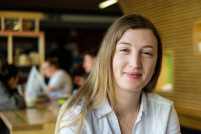
Described as "literature without borders", Comparative Literature discovers different cultures through their own artistic traditions and literature. Can literature ever be truly global? What can a book say that a film cannot? What makes a tragedy by Sophocles so different from one written by Shakespeare? Comparative Literature asks these questions, and many more.
Comparative Literature crosses the boundaries between literature and film, visual arts and popular culture. You will discover works from the ancient classics of Greece and Rome to the modern age, developing an understanding of historical and cross-cultural literary traditions and the ways in which they interact.
Discover works from Europe and the Americas, Asia and Africa, looking at genres including the novel, the short story, poetry, autobiography, drama, and the epic, with a particular emphasis on how literary forms have evolved in different cultures and linguistic traditions.
Explore questions such as: How have writers such as James Joyce engaged with Greek mythology? What is the evolution of the fairy tale from Charles Perrault to Walt Disney? In what ways might an English nineteenth-century novel of female adultery relate to a French, German, or Russian one?
Themes and areas you will explore include fiction and power; sex and gender; childhood and adolescence; crime fiction; literature and testimony; literature and seduction and creative writing.
You do not need to be able to read a foreign language to study Comparative Literature. While we encourage you to engage with foreign languages, you study translated works alongside literature originally written in English.
Michael talks about his Comparative Literature course at Kent.
Our graduates work in all kinds of professional roles including education, publishing, PR and journalism. This is due to the excellent analytical, writing, organisational and presentation skills they gain through their studies, as well as our structured programme of employability events.
You could broaden your horizons by spending a year studying at one of our many partner institutions around the world. This chance to immerse yourself in another culture not only enriches your literary studies but is also a wonderful opportunity for personal and career development. See Kent's Go Abroad pages for more information. Alternatively, you could spend a year on a work placement, gaining valuable experience and enhancing your employability.
The Department of Comparative Literature at Kent was one of the first of its kind in the country. Our research feeds into our teaching, so you are taught by experts, in a welcoming and friendly community.
In addition to lectures and seminars, you can take part in events including literary readings, guest lectures and seminars. You can also join student societies such as the Creative Writing, Literature, Poetry and Comparative Literature societies. The Gulbenkian has a theatre hosting work by theatre companies and a cinema showing contemporary, classic and independent films.

The variety on my course has made me adaptable and I think I’ve gained a lot of transferable skills, so I feel I have lots of options.
Naomi Gilad - Comparative Literature
Please also see our general entry requirements.
BBB
The University will not necessarily make conditional offers to all Access candidates but will continue to assess them on an individual basis.
If we make you an offer, you will need to obtain/pass the overall Access to Higher Education Diploma and may also be required to obtain a proportion of the total level 3 credits and/or credits in particular subjects at merit grade or above.
The University will consider applicants holding BTEC National Diploma and Extended National Diploma Qualifications (QCF; NQF; OCR) on a case-by-case basis. Please contact us for further advice on your individual circumstances. A typical offer would be to achieve DDM.
34 points overall or 15 at HL
Pass all components of the University of Kent International Foundation Programme with a 60% overall average including 60% in Academic Skills Development.
International students should visit our International Student website for further specific information. International fee-paying students who require a Student visa cannot study part-time due to visa restrictions.
Please see our English language entry requirements web page.
If you need to improve your English language standard as a condition of your offer, you can attend one of our pre-sessional courses in English for Academic Purposes before starting your degree programme. You attend these courses before starting your degree programme.
Duration: 3 years full-time, 6 years part-time
The following modules are indicative of those offered on this programme. This listing is based on the current curriculum and may change year to year in response to new curriculum developments and innovation.
On most programmes, you study a combination of compulsory and optional modules. You may also be able to take ‘elective’ modules from other programmes so you can customise your programme and explore other subjects that interest you.
The 2021/22 annual tuition fees for this programme are:
For details of when and how to pay fees and charges, please see our Student Finance Guide.
For students continuing on this programme, fees will increase year on year by no more than RPI + 3% in each academic year of study except where regulated.*
The University will assess your fee status as part of the application process. If you are uncertain about your fee status you may wish to seek advice from UKCISA before applying.
Find out more about accommodation and living costs, plus general additional costs that you may pay when studying at Kent.
We have a range of subject-specific awards and scholarships for academic, sporting and musical achievement.
Search scholarshipsKent offers generous financial support schemes to assist eligible undergraduate students during their studies. See our funding page for more details.
You may be eligible for government finance to help pay for the costs of studying. See the Government's student finance website.
Scholarships are available for excellence in academic performance, sport and music and are awarded on merit. For further information on the range of awards available and to make an application see our scholarships website.
At Kent we recognise, encourage and reward excellence. We have created the Kent Scholarship for Academic Excellence.
The scholarship will be awarded to any applicant who achieves a minimum of A*AA over three A levels, or the equivalent qualifications (including BTEC and IB) as specified on our scholarships pages.
For most modules, you have one two-hour seminar per week. The Final-Year Dissertation is based entirely on your private research but is supervised by a tutor and includes workshops and the chance to participate in an undergraduate conference.
Assessment varies by module, from 100% coursework to a combination of examination and coursework, usually in the ratio 50:50 or 40:60.
For a student studying full time, each academic year of the programme will comprise 1200 learning hours which include both direct contact hours and private study hours. The precise breakdown of hours will be subject dependent and will vary according to modules. Please refer to the individual module details under Course Structure.
Methods of assessment will vary according to subject specialism and individual modules. Please refer to the individual module details under Course Structure.
The programme aims to:
You gain knowledge and understanding of:
You gain the following intellectual abilities:
You gain subject-specific skills in the following:
You gain transferable skills in the following:

Of final-year Comparative Literature students who completed the National Student Survey 2021, 91% were satisfied with the feedback on their course.
Our graduates have gone on to work in areas including:
The University has a friendly Careers and Employability Service, which offers advice on how to:
We offer a number of modules with direct relevance to the world of work, including options that focus on teaching.
Alongside specialist skills, you also develop the transferable skills graduate employers look for, including the ability to:
You can also gain extra skills by signing up for one of our Kent Extra activities, such as learning a language or volunteering.
This course page is for the 2021/22 academic year. Please visit the current online prospectus for a list of undergraduate courses we offer.
T: +44 (0)1227 768896
T: +44 (0)1227 823254
E: internationalstudent@kent.ac.uk
Discover Uni is designed to support prospective students in deciding whether, where and what to study. The site replaces Unistats from September 2019.
Discover Uni is jointly owned by the Office for Students, the Department for the Economy Northern Ireland, the Higher Education Funding Council for Wales and the Scottish Funding Council.
It includes:
Find out more about the Unistats dataset on the Higher Education Statistics Agency website.